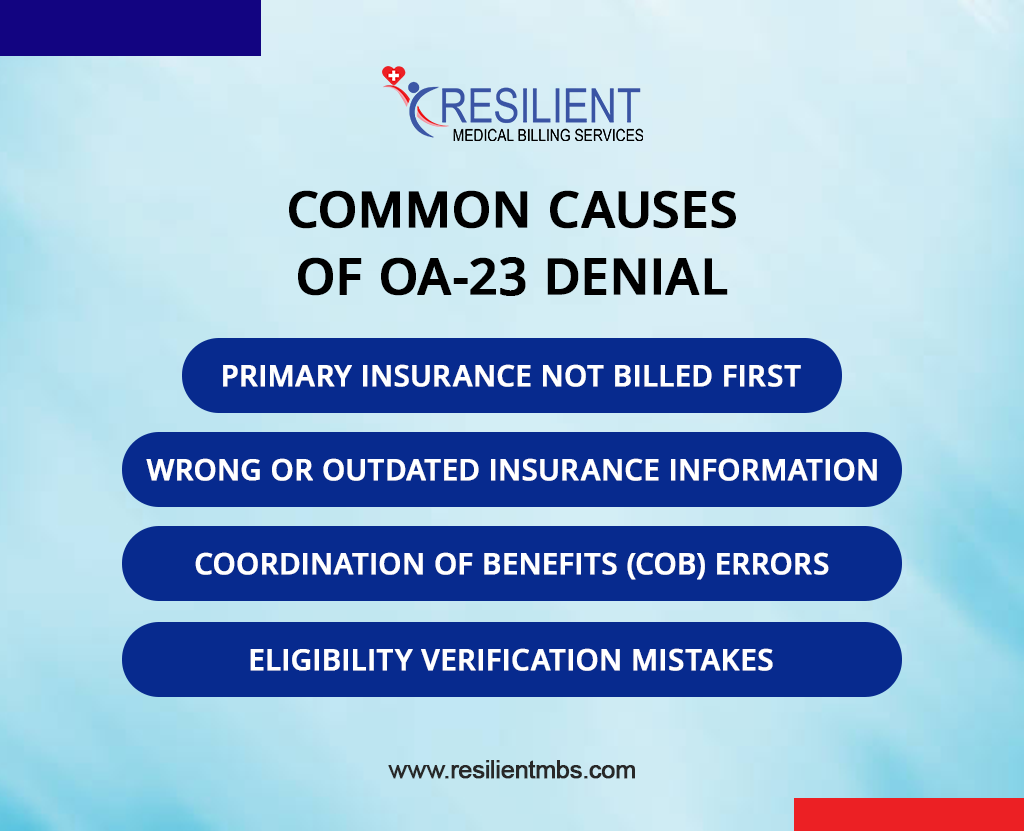Claim denials are one of the biggest challenges in medical billing, delaying payments, increasing administrative work, and interrupting the financial stability of a healthcare practice. Understanding denial reason codes in medical billing is essential for avoiding rejections and improving the accuracy of claim submissions.
Among these, the OA-23 Denial Code is one of the most frequent, and often one of the most preventable. This denial appears when a claim is incorrectly billed to the wrong payer because the primary insurance was not billed first. In most cases, OA-23 is tied to Coordination of Benefits (COB) issues, especially when a patient has multiple insurance policies such as employer-sponsored plans, Medicare, Medicaid, or supplemental coverage.
Other related codes, such as OA-18 Denial Code, also highlight billing order problems or duplicate claim submissions. Understanding OA-23 and similar denials helps providers avoid delays, get reimbursed faster, and maintain compliance with payer rules.
At Resilient MBS, we specialize in eliminating recurring denial patterns like OA-23, improving COB accuracy, and helping providers maintain a clean, efficient revenue cycle.
What Is the OA-23 Denial Code?
The OA-23 Denial Code means the insurance company is rejecting the claim because it was submitted to the wrong payer. The insurer is informing the provider that another insurance plan should be billed first, and they will not process the claim until the correct billing order is followed.
This denial is directly related to Coordination of Benefits (COB), the rules that determine the correct sequence in which multiple insurance plans must pay.
Common reasons OA-23 occurs:
- The secondary insurance was billed before the primary insurance.
- The payer’s records show the patient has multiple active insurance plans.
- Insurance or demographic details are incomplete or outdated.
- COB information was never verified or was entered incorrectly in the system.
OA-23 does not question the medical necessity or service provided. It simply indicates that the claim must follow the proper COB order before processing.
Understanding and preventing OA-23 helps practices reduce aging claims, avoid payment delays, and maintain an efficient reimbursement workflow.
OA-23 Denial Code Description
The OA-23 Denial Code description states that the claim was “submitted to the wrong payer”, meaning the insurance carrier requires the claim to be billed to another insurer first. This is especially common when patients have:
- Primary and secondary commercial insurance
- Medicare + supplemental coverage
- Medicaid as a secondary payer
- Dual employer plans
- Coordination rules for minors under both parents’ plans
Situations that commonly trigger OA-23:
- Billing a secondary carrier before the primary
- Submitting outdated insurance information
- Incorrectly determining the primary payer for dependent children
- Billing Medicaid first, even when commercial insurance exists
- Missing or incorrect COB updates in payer databases
These scenarios highlight the importance of verifying and updating insurance information regularly to avoid denials.
Common Causes of OA-23 Denial
Understanding the main causes behind the denial is key to prevention. OA-23 typically happens because of the following:
1. Primary Insurance Not Billed First
The most common cause. Providers accidentally bill secondary insurance before the primary payer has processed the claim.
2. Wrong or Outdated Insurance Information
Insurance details change frequently, new jobs, new employer plans, terminated coverage, etc. If these updates are not captured, claims are submitted to the wrong insurance.

3. Coordination of Benefits (COB) Errors
COB errors happen when the billing staff does not correctly determine which insurer should pay first, especially in cases involving Medicare, Medicaid, or dual commercial plans.
4. Eligibility Verification Mistakes
When eligibility is not checked thoroughly, claims may be sent to an inactive or wrong plan, triggering OA-23.
These root causes are preventable with accurate eligibility checks and robust COB processes.
How to Fix OA-23 Denials
Fixing OA-23 is typically straightforward if you follow the correct steps.
Step 1: Identify the Primary Insurance
Verify:
- Active coverage
- Policy start and end dates
- Relationship to the subscriber
- Employer coverage updates
- Medicare/Medicaid secondary rules
Use tools like payer portals, clearinghouses, and real-time eligibility checks. If there is any uncertainty, call the insurance directly to confirm COB.
Step 2: Correct the Claim and Resubmit
Once the primary insurer is confirmed:
- Update the patient’s insurance file
- Submit the claim to the correct primary payer
- After receiving the EOB from the primary payer, submit it to the secondary
Ensuring proper order is the key to preventing repeated denials.
Step 3: Prevent Future OA-23 Denials
- Verify insurance at every visit
- Update COB information regularly
- Train staff on payer-specific COB rules
- Use eligibility tools that automatically detect multiple insurances
At Resilient MBS, we help practices build stronger verification workflows to reduce COB-related denials permanently.
How to Correct Claim Information Before Resubmission
When correcting claims after an OA-23 denial, follow these steps:
Update all insurance information
Ensure accuracy:
- Subscriber ID
- Group number
- Insurance plan name
- Policyholder details
- Coordination of Benefits order
Bill the primary payer first
Submit the claim to the correct insurer and wait for the Explanation of Benefits (EOB).
Check coding accuracy
Ensure diagnosis, CPT, and modifier codes match documentation and payer rules.
Attach EOB when billing secondary insurance
Secondary payers often deny claims without proof that the primary has processed it.
Verify eligibility again
Before resubmission, confirm active coverage to avoid repeating the denial.
COB Strategies for Faster Claim Payments
Effective Coordination of Benefits (COB) management drastically reduces OA-23 denials. Here’s how to improve your COB workflow:
1. Collect Complete Insurance Details
At registration, gather:
- All active insurance plans
- Policyholder relationship
- Effective dates
- Medicare/Medicaid status
- COB rules for dependents
2. Use Clear COB Verification Questions
Ask patients:
- Have you changed jobs?
- Do you have new insurance?
- Is there any secondary insurance?
- Are you covered under someone else’s plan?
3. Understand Payer-Specific COB Rules
For example:
- Medicaid is always the payer of last resort
- Medicare Secondary Payer rules vary by employer size
- Divorce rules decide which parent’s plan is primary
4. Regular Coverage Checks
Insurance plans can update COB information monthly, making routine verification essential. These steps ensure faster claim payments and fewer OA-23 rejections.
Verifying Eligibility and Primary Insurance
Eligibility verification should be a standard step in your billing workflow. Use clearinghouse tools to validate:
- Active coverage
- COB order
- Deductible and co-insurance details
- Policy start and termination dates
For complex cases, auto accidents, workers’ compensation, and liability claims, call the payer directly to confirm details. Documenting every verification step protects your practice during audits and improves billing accuracy.
Tools to Simplify COB Management
Modern billing technology helps eliminate COB errors and OA-23 denials.
Effective tools include:
- Automated eligibility verification
- COB hierarchy automation that assigns primary/secondary payers
- Denial analytics dashboards to identify OA-23 trends
- Integrated payer portals for real-time responses
- EOB tracking systems
Using these tools helps practices streamline billing, reduce denial rates, and improve revenue performance.
Understanding OA-23 vs OA-18 Denial Codes
Although both are common denial codes, they have very different meanings.
OA-23 Denial Code
- Indicates the wrong payer was billed
- Involves Coordination of Benefits (COB)
- Requires updating primary insurance and resubmitting
OA-18 Denial Code
- Indicates duplicate billing
- Payer already processed the claim
- Caused by duplicate submissions or system errors
Why these happen
- OA-23: wrong primary payer, outdated info, missed eligibility
- OA-18: same claim submitted twice, incorrect corrections, system delays
How to fix them
- OA-23: Verify primary payer → correct claim → resubmit
- OA-18: Check past submissions → avoid duplicates → correct and resubmit only when needed
Understanding the difference prevents confusion and keeps your billing cycle efficient.
Bottom Line
The OA-23 Denial Code occurs when a claim is billed to the wrong payer due to incorrect or outdated Coordination of Benefits information. Preventing OA-23 requires verifying coverage, identifying the primary insurer, updating records, and billing in the correct order.
Proactively managing COB and eligibility ensures fewer delays, cleaner claims, and a stronger revenue cycle.
If your practice struggles with OA-23 or other COB-related denials, Resilient MBS is here to help. Our experts streamline your billing process, eliminate errors, and improve reimbursement outcomes.
Ready to reduce OA-23 denials? Contact Resilient MBS today for reliable, expert billing support.
FAQs
What does OA-23 Denial Code mean?
OA-23 indicates another payer should be billed first. The claim was submitted in the wrong order, and the primary insurance must process it before the secondary.
Why do claims get denied with OA-23?
Claims receive OA-23 due to incorrect primary insurance information, outdated COB records, or billing the wrong payer first.
How do I fix an OA-23 denial?
Verify the primary insurer, correct COB details, update patient records, and resubmit the claim to the correct payer.
How can I prevent OA-23 denials in the future?
Verify eligibility at every visit, confirm COB regularly, and maintain accurate insurance records.
What is the difference between OA-23 and OA-18 denial codes?
OA-23 happens when another payer should be billed first. OA-18 is a duplicate billing denial when the same claim is submitted more than once.










